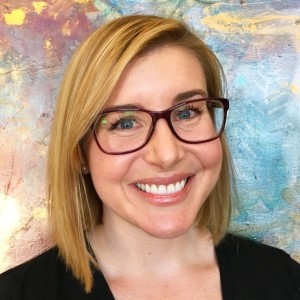Co-Directors
The AEDC is co-directed by Dr. Tiffany Brown and Dr. April Smith, who each have over a decade of experience treating eating disorders and disordered eating. Drs. Brown and Smith supervise the graduate student clinicians providing services at AEDC.
 Dr. Tiffany Brown (she/her) is an Assistant Professor in the Department of Psychological Sciences at Auburn University and a licensed clinical psychologist. She has been working within the eating disorders field since 2008 and completed her graduate training in clinical psychology at Florida State University in 2016. She completed her pre-doctoral internship at the University of California, San Diego Eating Disorders Center for Treatment and Research where she also completed her post-doctoral fellowship and later served as a staff psychologist. She has treated individuals with eating disorders ages 6+ at outpatient, intensive outpatient, partial hospitalization, and inpatient/medical stabilization levels of care using cognitive behavioral therapy, dialectical behavior therapy, and family-based therapy. She also specializes in the treatment of eating and body-image related disorders in diverse and understudied populations including men and LGBTQ+ individuals and has extensive experience treating ARFID.
Dr. Tiffany Brown (she/her) is an Assistant Professor in the Department of Psychological Sciences at Auburn University and a licensed clinical psychologist. She has been working within the eating disorders field since 2008 and completed her graduate training in clinical psychology at Florida State University in 2016. She completed her pre-doctoral internship at the University of California, San Diego Eating Disorders Center for Treatment and Research where she also completed her post-doctoral fellowship and later served as a staff psychologist. She has treated individuals with eating disorders ages 6+ at outpatient, intensive outpatient, partial hospitalization, and inpatient/medical stabilization levels of care using cognitive behavioral therapy, dialectical behavior therapy, and family-based therapy. She also specializes in the treatment of eating and body-image related disorders in diverse and understudied populations including men and LGBTQ+ individuals and has extensive experience treating ARFID.
 Dr. April Smith (she/her) is an Assistant Professor in the Department of Psychological Sciences at Auburn University and a licensed clinical psychologist. She started working in the fields of eating disorders and self-injury in 2006 and completed her graduate training in clinical psychology at Florida State University in 2012. She completed her pre-doctoral internship at the University of California, San Diego Eating Disorders Center for Treatment and Research. Dr. Smith has worked with individuals experiencing a wide array of eating concerns across the lifespan and at multiple levels of care. Dr. Smith employs the leading eating disorders treatments, including cognitive behavioral therapy, dialectical behavior therapy, and family-based therapy. She also specializes in the treatment of self-injurious thoughts and behaviors.
Dr. April Smith (she/her) is an Assistant Professor in the Department of Psychological Sciences at Auburn University and a licensed clinical psychologist. She started working in the fields of eating disorders and self-injury in 2006 and completed her graduate training in clinical psychology at Florida State University in 2012. She completed her pre-doctoral internship at the University of California, San Diego Eating Disorders Center for Treatment and Research. Dr. Smith has worked with individuals experiencing a wide array of eating concerns across the lifespan and at multiple levels of care. Dr. Smith employs the leading eating disorders treatments, including cognitive behavioral therapy, dialectical behavior therapy, and family-based therapy. She also specializes in the treatment of self-injurious thoughts and behaviors.
Graduate Student Clinicians

Rachel Andrade-Frietchen, M.S. (she/her) is a third-year clinical psychology Ph.D. student at Auburn University. Prior to graduate school, Rachel completed her undergraduate degree at George Mason University and worked as a research assistant at Butler Hospital. Her research interests are identifying risk and protective factors for nonsuicidal self-injury, disordered eating, and suicide, especially in LGBTQ+ folks. Clinically, Rachel integrates Cognitive Behavioral Therapy, Dialectical Behavior Therapy, and Acceptance and Commitment Therapy to help clients build a life that is aligned with their values, worth living for, and is not ruled by disordered eating or body image concerns. In her free time, Rachel enjoys reading, listening to music, hiking, painting, spending time with friends, and playing with her cat, Norbert.
 Olivia (Liv) Clancy, M.S. (she/her) is a fourth-year student in the clinical psychology program at Auburn University. She received her B.S. in Applied Psychology with a concentration in Child and Adolescent Mental Health Studies from New York University in 2020 and her M.S. in Psychology from Drexel University in 2022. Her research hopes to improve treatment outcomes for children and adolescents with eating disorders by empowering and supporting caregivers. Liv is passionate about providing evidence-based care, often relying on family-based treatment (FBT), enhanced cognitive behavioral therapy (CBT-E), and dialectical behavior therapy (DBT).
Olivia (Liv) Clancy, M.S. (she/her) is a fourth-year student in the clinical psychology program at Auburn University. She received her B.S. in Applied Psychology with a concentration in Child and Adolescent Mental Health Studies from New York University in 2020 and her M.S. in Psychology from Drexel University in 2022. Her research hopes to improve treatment outcomes for children and adolescents with eating disorders by empowering and supporting caregivers. Liv is passionate about providing evidence-based care, often relying on family-based treatment (FBT), enhanced cognitive behavioral therapy (CBT-E), and dialectical behavior therapy (DBT).
 Kristin Denmark, M.S. (she/her) is a third-year clinical psychology Ph.D student at Auburn University. Prior to graduate school, Kristin completed her undergraduate degree at Auburn University. Her research interests include examining negative body talk and related pathological constructs within individuals experiencing body-related concerns or eating disorders. She hopes to aid in developing and implementing prevention and treatment methods for those underrepresented within eating disorder literature. Clinically, Kristin is deeply committed to helping individuals rediscover life beyond the eating disorder. She seeks to integrate evidence-based treatment with compassion, humor, and honesty, helping clients rebuild trust in their bodies, find freedom with food, and foster identity development.
Kristin Denmark, M.S. (she/her) is a third-year clinical psychology Ph.D student at Auburn University. Prior to graduate school, Kristin completed her undergraduate degree at Auburn University. Her research interests include examining negative body talk and related pathological constructs within individuals experiencing body-related concerns or eating disorders. She hopes to aid in developing and implementing prevention and treatment methods for those underrepresented within eating disorder literature. Clinically, Kristin is deeply committed to helping individuals rediscover life beyond the eating disorder. She seeks to integrate evidence-based treatment with compassion, humor, and honesty, helping clients rebuild trust in their bodies, find freedom with food, and foster identity development.
 Marley Billman Miller, MS (she/her) is a third-year clinical psychology PhD student at Auburn University. Marley specializes in working with children and adolescents, specifically with those seeking services for eating disorders, anxiety, depression, oppositional defiant disorder, attention-deficit/hyperactivity disorder, and/or autism spectrum disorder. In her clinical work, Marley primarily uses a cognitive-behavioral framework, while also integrating techniques from interpersonal therapy and dialectical behavior therapy. She emphasizes a strengths-based, person-centered approach and values active involvement of families in treatment planning. Marley is particularly interested in examining how individual differences and intersectional identities shape the development, experience, and treatment of mental health concerns. Long term, she hopes to use data-driven approaches to individualize and improve mental health treatment.
Marley Billman Miller, MS (she/her) is a third-year clinical psychology PhD student at Auburn University. Marley specializes in working with children and adolescents, specifically with those seeking services for eating disorders, anxiety, depression, oppositional defiant disorder, attention-deficit/hyperactivity disorder, and/or autism spectrum disorder. In her clinical work, Marley primarily uses a cognitive-behavioral framework, while also integrating techniques from interpersonal therapy and dialectical behavior therapy. She emphasizes a strengths-based, person-centered approach and values active involvement of families in treatment planning. Marley is particularly interested in examining how individual differences and intersectional identities shape the development, experience, and treatment of mental health concerns. Long term, she hopes to use data-driven approaches to individualize and improve mental health treatment.